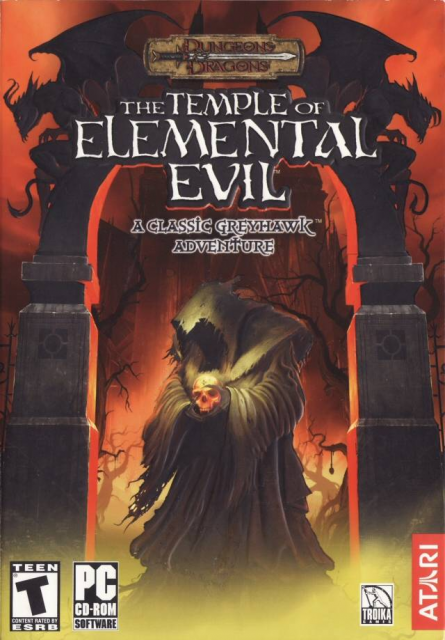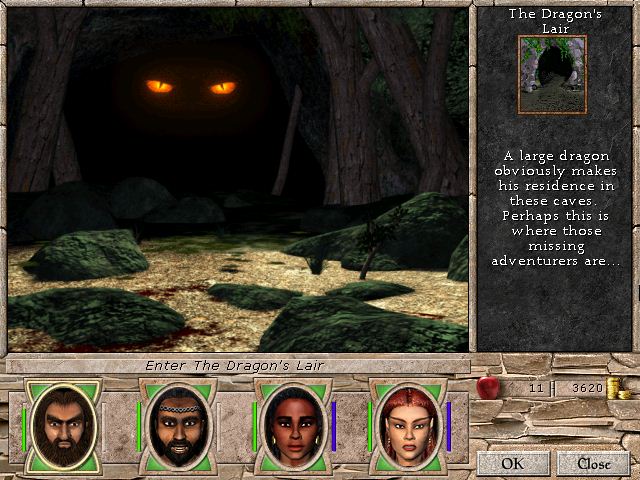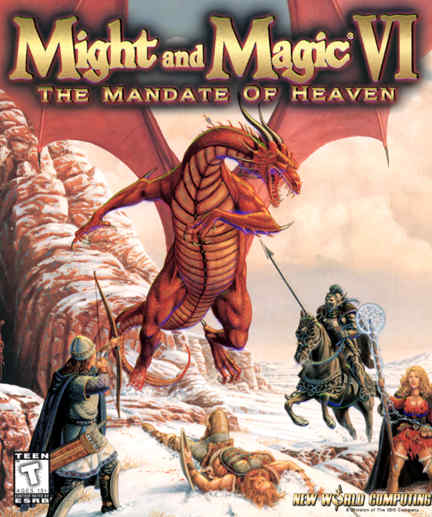Rebuild of ArbitraryWater 2.22: Sometimes You Can (Not) Go Home Again
By ArbitraryWater 4 Comments

When I started blogging on this site a decade ago, my original focus was almost entirely on older video games that I had “missed.” While part of this was an attempt to distinguish myself from the other blogging types, it was also an extension of what I was already doing. I spent my early teenage years locked to Nintendo consoles and a desktop computer my parents bought in 2002. While I eventually got a Xbox 360 in 2007, I didn’t exactly have the disposable income to keep up with the current release zeitgeist more than a few times per year. Thus, a lot older PC games, often obtained cheaply or illegally often served to fill that void. It’s why I, someone now in his mid-20s, occasionally seem to have the taste of someone a decade older. It’s also worth mentioning there’s a wide gulf between the kinds of games that were popular during the early 360 era and the kind of games that were popular on the PC in the late 90s/early 00s. Say what you will about the quality of the 360's library, but it didn't have anything resembling most of the PC games I was messing around with.
I’ve now reached the age where a lot of my childhood favorites are inching towards or have passed the 20 year mark. The majority of the Nintendo 64’s catalog is already there, and so are many of those old PC games I was blogging about during the early years of the Giant Bomb forums. I’ve always thought the discussion over whether or not something “holds up” to be sort of reductive, but I also think it’s healthy to examine one’s own nostalgia instead of keeping it locked up in a box of perfect memories. With that in mind, I finally replayed one of my favorite games of all time a few months ago. It was an, uh, interesting experience.
Might and Magic VII, or: “The Curse of Remembrance”
Might and Magic VII, indeed the entire Might and Magic franchise, is arguably just as foundational to my love of Computer Role-Playing games as Knights of the Old Republic and Baldur’s Gate II. Compared to fellow classic RPG counterparts such as Wizardry (which focused on more in-depth party building and ambitious or Ultima (which focused on simulationist elements, storytelling, and characterization) I’d place Might and Magic’s focus as exploration and discovery. While still capturing that very basic dungeon crawler appeal of taking a player-created party of weaklings and turning them into unstoppable juggernauts, from the series beginning it’s always been set in the context of a large, explorable world whose secrets you’d spend most of the game uncovering. Might and Magic VII: For Blood and Honor was my favorite because it set that exploration and discovery in a smaller, more-focused scale than some of its predecessors. It had more built-in replayability (a thing that mattered when you were young and didn’t have a shameful amount of unplayed games in your Steam library,) with its two story paths and wider variety of classes. Depending on party composition and the path chosen, you could see a much different chunk of the game than someone who went another way.

It’s a strange experience, going back to a game that you played to death as a young teenager, but haven’t touched in at least a decade. There’s still a part of it hard-wired in some dark adolescent corner of my brain, alongside random Fire Emblem growth rates, Homestar Runner quotes, and snippets of innumerable questionable-to-bad fantasy novels. How do you approach a game focused on exploration and discovery when you half-remember where everything is? Being a game from 1999, the discrete zones in Might and Magic VII are not especially large, nor are the dungeon puzzles especially taxing. As a result, with some minor glances at a guide, I zoomed through the game in like 20 hours, a sort of slow-motion speedrun. With some strange crystal clarity, I saw the limitations and weaknesses of the game’s design, once unseen or in the background. Earth and Mind magic basically have like two useful spells each. Rangers are kind of bad at everything. You're often better off just buffing everyone to death and mashing the A key than you are going into turn-based mode and planning out your moves.
I know this sounds like some sort of weird paean to lost innocence, but it also means I have no fucking clue how another human being would approach this game fresh in 2019. I mean, I enjoyed myself, I think it’s still a solidly-designed game, but keeping any sort of critical distance to explain it to other people is difficult. Would you, the reader, like Might and Magic VII if you picked it up from GOG, installed the fan patch (bug fixes, QoL improvements, high-resolution and windowed support, etc) and went to town? I honestly don’t know. Probably? It's probably still good? You might be able to delve something out of my comments, but I’m not sure if I can anymore.
This isn’t the first time I’ve felt this way, mind you, it was also how I felt after I played through Ocarina of Time a couple of years ago. Previously one of the games in my “replay every few years” rotation, my most recent playthrough on 3DS felt less like a comfortable return to an old friend and more like a cold mechanical script that I followed without much trouble. How do the dungeons of OoT compare to the other 3D entries? Are the side-quests fun or frustrating? What about Gold Skultilla placement? Hell if I know. Ask this guy. What I do know is that when I do decide to go back and revisit Ocarina of Time, I’m going to play the Master Quest mode. Mirroring the world is a simple, but effective method to disorient, and if you think I remember anything about the remixed dungeons from the time I played through the Gamecube Bonus Disk… I don’t.

Back to the main topic of discussion, I need to give full credit where credit is due: the source of my problem is ironically also one of my favorite things about of Might and Magic VII (and the other two games on the same engine.) The difficulty level and your progression through the game are far less tied to the stats of your characters (or your progress in the main questline) than your knowledge of the world and the amount of cash you have on hand at any given moment. Money is more important than experience, because not only do you need to pay to level up, you need to pay for spells, skill training, and equipment. Vaguely knowing how to get that money and spend it in the most efficient way possible means you can break the difficulty curve in short order. Master-level magic, from flight to invisibility to regeneration to shrapmetal, not only make exploration and discovery more convenient, they also allow you to circumvent a lot of areas or sequences that might otherwise cause you problems, either by flying, sneaking past, tanking through, or just plain shotgunning your way to victory. In a world where I didn’t already know exactly how to break things, finding these things out organically would be a huge game changer. It’s also an excellent way of party composition directly impacting player experience. Swap out the pure caster classes (Cleric, Sorcerer) for their hybrid counterparts (Paladin, Archer, Druid) and suddenly you can’t get access to those spells until much later, which might drastically change how you approach certain situations.

It’s an incredibly flexible game in this way, and I think that’s one of the reasons I played it so much. Compare that to something like Wizardry 8, a game in the same genre from the same era that’s similar on paper. While still you can definitely wander into places you have no business exploring for your own peril and profit and come up with unorthodox party compositions, the aggressive level scaling and deeper, more involved combat means there are rarely any shortcuts from playing the game at the developer’s pace. Knowing where to go to solve quests may save you a few hours of exploration, but at no point are there ever going to be wonderfully incomprehensible 27-minute speedruns of that game. I think Wizardry 8 is quite good, and it’s definitely one of my favorite CRPGs, but it doesn’t nail the exploration and discovery aspects in nearly the same way as Might and Magic.
So… where does this series of ruminations leave me? Physically? Emotionally? Spiritually? “Does it hold up?” I’m not going to throw all of my nostalgic faves to the sidelines over the fear that I’ll ruin them with my broken brain, but it’s made me think about why I choose to revisit old favorites. I don’t think I can deal with investing much in comfortable repetition anymore, at least not outside of my “comfort food” strategy games or speedrunning old Resident Evil games every now and then. Does that make me weird? I see people who are on like their eighth dang rewatch of The Office and I can’t understand that anymore. My time is limited, my tastes are varied, and if I’m going to put a significant amount of time into something I’ve already seen/played/done then I’d hope to get something new or interesting out of it. Make me love it again, make me hate it. Just don’t leave me confused enough to write 1,500+ words about it. Man, I hope any of this made any sense to you, because it almost doesn't to me.
A Corollary: Neon Genesis Evangelion

I mean, I feel like you could’ve guessed this was coming eventually, given that the title of this blog series is an Evangelion reference. Like Might and Magic, Evangelion occupies a very important, formative spot in my adolescence. If you want to point to the reason why a lot of my favorite anime series are weird, dark, and/or slightly fucked up, watching EVA while being slightly-too-young for it is probably a non-insignificant factor. (no, seriously, I was probably too young for it, especially since the only anime I’d been exposed to prior were series that aired on Cartoon Network’s Toonami block) Like Might and Magic, it’s been about a decade since I last revisited EVA. Unlike Might and Magic, my revisit of Evangelion was an unambiguously positive one.
Thanks to the recent Netflix release and return to the public eye, you’ve probably already had your fill of discussion on everyone’s favorite super fun story about a boy who won’t get into a cool purple robot, so I’ll keep it brief. Rewatching EVA was a much more emotionally draining experience than I was expecting. I’m genuinely shocked by how much of the series seemingly flew over my head when I was younger, but I’m more surprised by how much more it resonated with my current situation as an adult (or everyone’s situation everywhere, honestly.) It’s equal parts brilliant, frustrating, and up its own ass (also occasionally problematic) but it’s also stuck with me in a way that most disposable “flavor of the season” anime series have not. It was a nice reminder that, for as much as time can make some things worse (or… qualitatively indescribable) it can also make things better.
Oh, by the way, I’d just like to say for the record that the Rebuild of Evangelion movies are great. If you want to watch Hideaki Anno throw a bunch of upraised middle fingers at his fans via a series of multi-million dollar films, they're worth your time. Messy? Yeah. Unnecessary? Maybe. But don't write them off.
